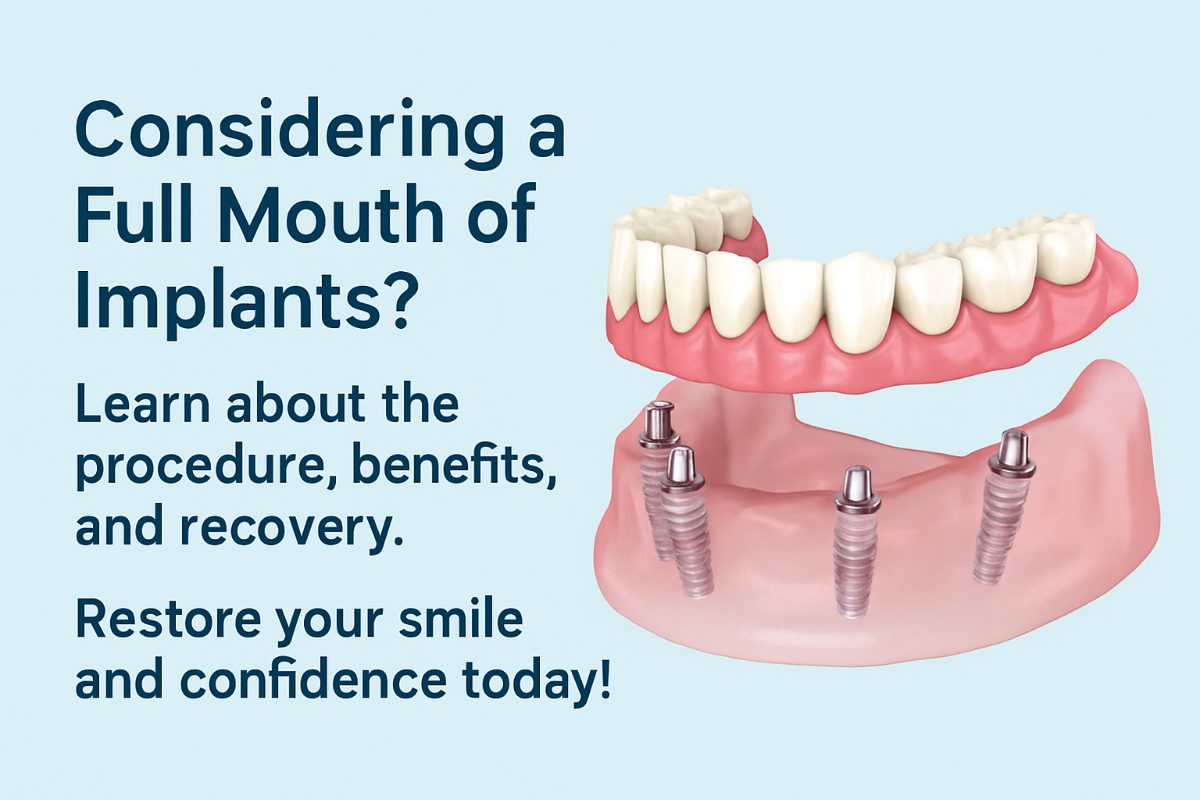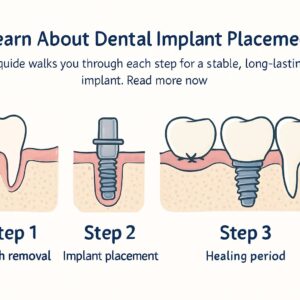If you’re asking “How much does a full mouth of implants cost?” you’re not alone. This post gives a real-world price range, explains what a full mouth of implants means, and outlines the steps and choices that affect price. By the end you’ll know the common options, rough cost brackets, what raises the bill, and practical ways to plan or finance treatment.
A full mouth of implants can mean different things. Read on to learn the difference between a fixed implant bridge and implant-supported dentures, typical timelines, and the factors that make prices vary greatly from person to person.
What a full mouth of implants is
A full mouth of implants replaces an entire upper arch, lower arch, or both. It differs from partial implant work that replaces just a few missing teeth.
Main approaches:
- Fixed full-arch (All-on-4 / All-on-6) — A permanent bridge secured to 4–6 implants. Patients can’t remove it themselves. It looks and functions like natural teeth.
- Implant-supported removable denture — A denture snaps onto 2–4 implants. It’s more affordable but removable for cleaning.
Timeline (quick view): planning and scans → surgery to place implants → healing and osseointegration (3–6 months usually) → final restoration (permanent bridge or denture). Some practices offer immediate provisional teeth on the day of surgery.
Typical cost ranges for a full mouth of implants
Costs vary widely by location, provider, materials, and how much preparatory work you need. Below are ballpark U.S. ranges to help you plan.
Example: All-on-4 / fixed arch
Typical cost for a single arch (including implants, temporary acrylic bridge, and final prosthesis) often runs from about $15,000 to $35,000 per arch. Higher-end labs, zirconia final bridges, or elite implant systems can push the price toward $40,000 or more per arch. For both arches, double these figures.
Typical components included:
- CBCT and treatment planning
- Surgery to place implants (4–6 per arch)
- Temporary teeth (same day or shortly after)
- Final fixed bridge or hybrid prosthesis
Example: Individual implants with crowns for every tooth
When every missing tooth is replaced with its own implant plus a crown, costs rise. Expect roughly $2,500 to $6,000 per tooth depending on the implant system and crown material. A full mouth this way (12–16 teeth per arch) can reach $40,000 to $100,000+ for a single arch. This option is chosen for maximum bite force and long-term individual tooth replacement.
What drives the price of a full mouth of implants
Surgery and implant hardware
- Number of implants: more implants = higher cost
- Implant brand: premium systems cost more but may offer different warranties
- Abutments and screws: custom parts add fees
Bone grafts, sinus lifts, and extractions
If you need extractions, bone grafting, or sinus lifts before implant placement, expect additional procedures and added time. These can add thousands to the overall cost.
Imaging, sedation, and diagnostics
CBCT scans and 3D surgical guides improve precision but add cost. Sedation options vary: local anesthesia is least expensive, nitrous oxide or oral sedation adds cost, and IV sedation or general anesthesia is pricier.
Materials and lab work
Prosthetic choices affect price: acrylic teeth on a titanium bar are less expensive than milled zirconia bridges or porcelain fused to zirconia. Lab fees for custom work are a major part of the final price.
The provider
Specialists (oral surgeons, prosthodontists) or surgeons with high experience and reputation often charge more. Clinic location and facility fees also matter.
How to afford a full mouth of implants
Insurance often doesn’t cover full implant treatments, or it may cover parts like extractions or a portion of the crown. Check policy details.
Payment options:
- Dental financing plans or third-party lenders (CareCredit, LendingClub)
- In-house payment plans from the dental office
- Using HSA or FSA funds for qualified expenses
- Staged treatment—treating one arch at a time to spread cost
Lower-cost alternatives: dental schools offer reduced-fee care, or implant-retained dentures offer a more affordable full-mouth solution. Always factor in warranty and follow-up care when comparing prices.
Risks, maintenance, and long-term value
Common risks include implant failure, infection, and prosthetic wear. Plan for emergency or complication costs—these are uncommon but possible.
Maintenance: daily cleaning, special floss or water flossers, and regular dental check-ups and cleanings. Prostheses may need occasional repairs or relining.
Long-term value: while upfront costs are high, implants often cost less over many years than repeated denture replacements or bridge work because they preserve bone, restore function, and last longer when well cared for.
How to choose the right implant team (and next steps)
Ask these questions at your consultation:
- How many full-arch cases have you done? Can I see before-and-after photos?
- Which implant system do you use and why?
- What is included in the quoted fee? Are scans, temporaries, and lab work included?
- What are your complication and success rates? Is there a written warranty?
- Will I get a written treatment plan and timeline?
Look for clear before/after photos, patient reviews, and a team that explains options in plain language. If you’re ready, schedule a consultation for a digital scan and a personalized treatment plan. For many patients exploring a full mouth of implants, a consultation with scans and a clear quote is the best next step.
Ready to learn more? Request a consultation and digital scan to get a custom estimate and treatment timeline.




